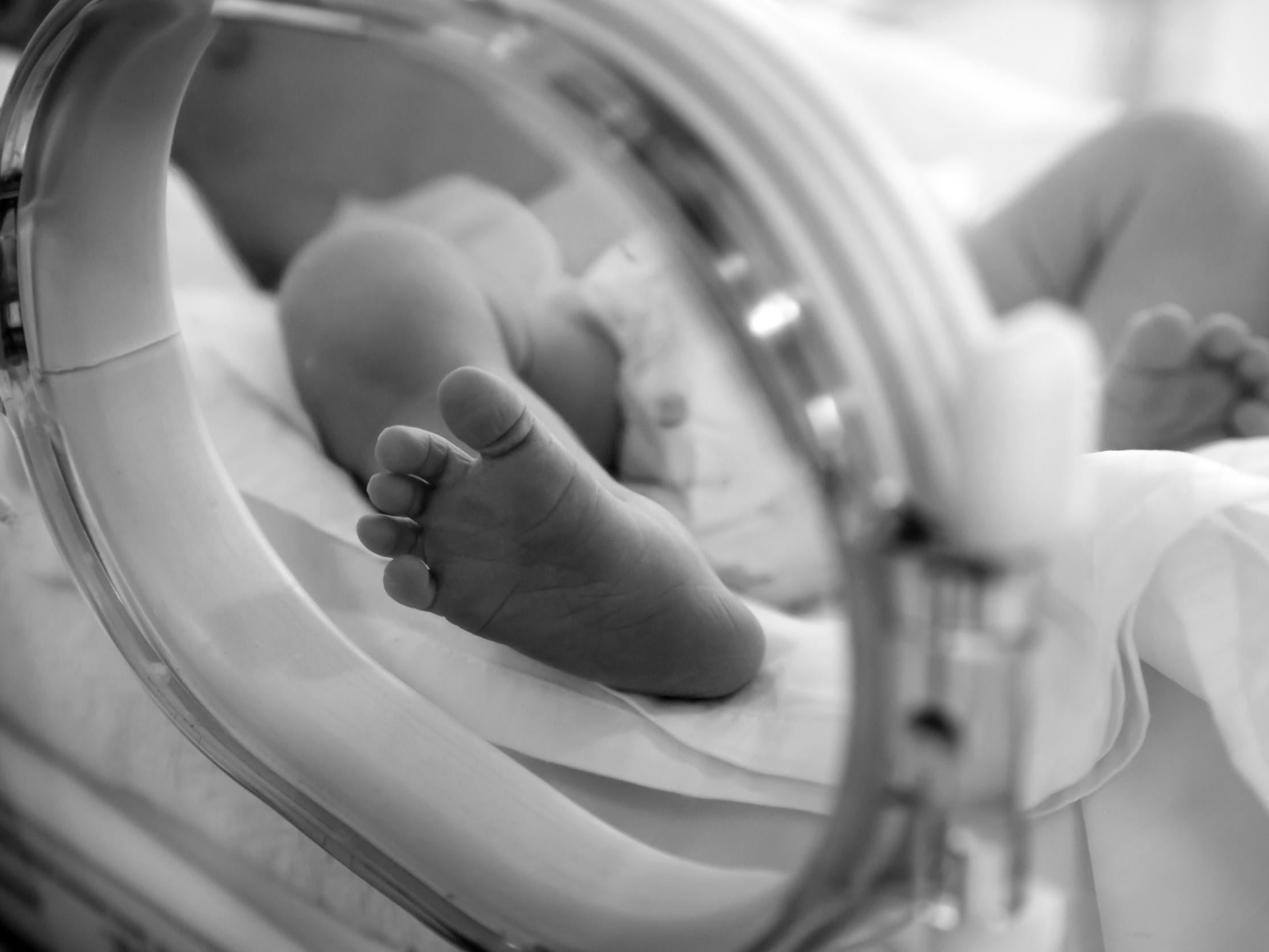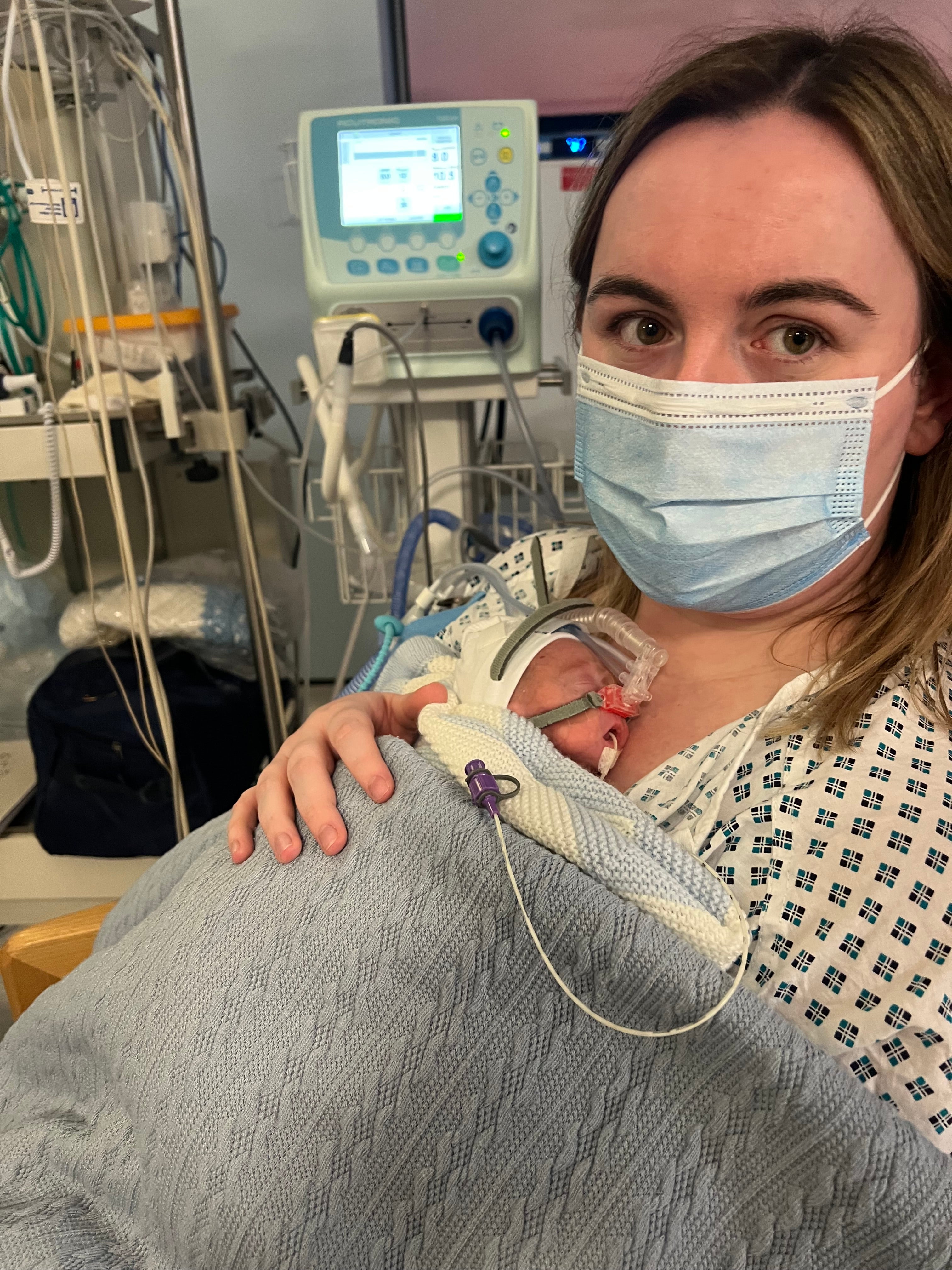‘I felt I had failed my baby spectacularly’: Mothers talk about the difficulties of neonatal intensive care
The knowledge that your newborn baby is receiving life-saving treatment is stressful to process. Lauren Crosby Medlicott speaks to mothers about the changes that could make time spent in NICU easier


With Mother’s Day fast approaching, Dr Frankie Harrison, a clinical psychologist who works with families who have been through neonatal intensive care, uploaded an Instagram post that said: “NICU mamas should never have to...”
The subsequent slides listed a handful of things that mums of children in neonatal intensive care units (NICU) have experienced while their newborn babies are receiving life-saving treatment in hospitals – like being placed on a postnatal ward with other newborn babies, and being told they aren’t allowed to hold their babies. More than a thousand mums responded to the post, sharing their own experiences of being NICU mamas.
“Most parents who go to NICU don’t expect they are going to end up there, yet one in seven babies need support from neonatal care,” Harrison says. “Initially, the feeling is often shock, and what can come with that is a spike in anxiety, hypervigilance, or numbness and dissociation as a way to cope with what is happening.”
When Aly Ward went into labour in Newcastle at only 31 weeks pregnant, she was terrified when 12 people rushed into the ward to assist with her baby’s delivery.
“Then he came out and cried,” the 36-year-old mum says. “And then they just took him and put him on a little resuscitation table on the other side of the room. I couldn’t see him for three hours. By the time I could see him, I wasn’t allowed to touch him. Couldn’t stroke him. It felt like this rupturing. I just felt I had failed him so spectacularly. Like my body had let him down.”
After 13 hours, Ward could finally touch and hold her son. Even though she was allowed to take her baby out of his incubator to hold him, the nurses limited his time in her arms, saying he was overstimulated and that holding him too much would be bad for him.
“I just constantly felt like I didn’t know what was best for my baby,” she says. “Like all of my instincts were wrong. I already felt like my body had failed him, and the NICU experience really compounded that.”
Christie Hanson, a neonatal sister with years of experience interacting with families of NICU babies, says she feels sad whenever she hears such stories.
“The place is full of monitors, alarms, and different healthcare professionals, and it can be quite intense and busy,” she says. “I can feel the general helplessness of parents when their babies are in the neonatal unit.”
The day after giving birth, Ward was discharged and drove away from her baby. It was the first day on which she would leave him in NICU; 29 more would follow. “It was the hardest thing I have ever done,” she says. “I would have these panic attacks and be sobbing over the incubator, and the nurse would tell me I had to be strong for him. It made me feel like I wasn’t good enough. That I should toughen up.”
Nicola Bland, 31, was admitted to a Belfast hospital when she was 34 weeks pregnant. Following an emergency caesarean delivery, the wound on her stomach became infected, leaving her in a huge amount of pain. Behind the curtain of the recovery room, she could hear the other five mothers in the room tending to their crying babies, while all she had to hold was a photo of her baby on a ventilator.

“Parents are often put on to postnatal wards with other parents who either have their babies with them or are in labour,” explains Harrison. “Being surrounded by people who have their babies, when yours is in a different ward, without you, fighting for their life, is unfair and incredibly painful.”
Bland felt “trapped”, in pain, confused about when she could get out of bed, and worried about when she should start trying express milk. “They told me there was plenty of time for that,” Bland recalls being told when she eventually spoke with a midwife about expressing milk.
Ten hours after her son’s birth, Bland was wheeled to NICU to see him, and was immediately informed by the NICU nurses that she should have begun expressing milk hours earlier.
“It was the start of a very difficult breastfeeding journey,” she says, remembering the pressure she put on herself as she walked by the signs in the NICU that said how breastfeeding was the best thing mums could do for their NICU babies. “My milk didn’t come in for a week. I felt like the only thing I could do for him as a mother was to breastfeed, so I was pumping every two hours but getting nothing.”
It wasn’t until months later, after breastfeeding for up to eight hours a day, that Bland felt she could give herself permission to combi-feed with formula. On reflection, she wishes someone had said earlier that it would be OK for her to give her baby formula.
During the days following her caesarean, Bland’s wound remained infected. She was given pain relief by the midwives on the ward, and 20 minutes later, the NICU nurses rang to say her son was distressed and asked if Bland could come to speak to him as he would recognise her voice. “The midwives on the ward said they didn’t want me to go down because I’d had a morphine-based medication,” she said. “I felt like a failure that I couldn’t go down to speak to him. Then I felt guilty because I had taken the pain relief.”
Though sleep-deprived and in pain, she still managed to visit her son in the NICU. Like Bland, mums being treated on postnatal wards often sacrifice their own care and wellbeing to try to meet the needs of their babies.
“Mums don’t sit and wait for treatment on postnatal wards,” says Harrison. “They sacrifice it to be able to be with their baby. They miss ward rounds, medication rounds, and meals – all fundamental, basic things that parents need to be able to heal.” According to Harrison, the system is not set up to support parents who have babies in NICU.

“When I left the hospital, I felt like I was being ripped apart,” says Michelle McBrearty-Sharp, 27. Her baby, who was born at nearly 27 weeks, is still in NICU. “We stay an hour away from home, so it is a long journey. I feel so far away from my baby.”
McBrearty-Sharp commutes to the hospital every day, save for recently, when she and her husband tested positive for Covid and had to stay at home. One of the hardest things for McBrearty-Sharp about having a child in NICU is the loss of confidence she has experienced as a mother.
After struggling to increase her milk supply, McBrearty-Sharp eventually made the decision to introduce bottle feeding.
“The first time I tried to feed him [with a bottle], I was encouraged to try different positions,” she says. “I tried to feed him like I was shown. The nurse approached me to say I was feeding him incorrectly, and continued to examine how I was feeding him. I explained how much she knocked my confidence, which led to an apology; however, I don’t feel that confidence ever returned.
“Also, every nurse works differently so you’re constantly adapting to how each nurse or consultant works, which is difficult. Some nurses do give you more freedom as a parent, which makes you feel great and involved – not as if you’re visiting your baby.”
Laureanna Bond, a 30-year-old new mum of premature identical twins, spent most of her pregnancy worrying that she would lose one, if not both, of her babies.
When the time came to give birth to them in July 2022, she was a litle more than 30 weeks pregnant. With no cots available anywhere near her home, Bond and her husband had to travel a two-hour drive from where the couple lived.
Following a traumatic emergency caesarean, Bond remembers looking at her babies without the rushing feeling of love she had expected. “My brain had just detached slightly from that situation,” she says. “That’s where the difficulty started.”
During the following weeks, one of Bond’s daughters was transferred to a surgical NICU. Bond stayed put, having been readmitted to the hospital with high blood pressure, while her husband travelled to be with their other daughter. Even though Laureanna is thankful for the life-saving treatment her two girls received, she felt that small changes would have made a world of difference to her own mental health.

“I really don’t want to say awful things about midwives, because they were wonderful,” she says. “But I do think there should be more training about how they should speak to parents of babies on the NICU.”
When her blood pressure started to rocket days after the birth, one of the midwives encouraged Bond to relax. “You try to look after two babies that are this poorly, with your family away from home and split up,” she remembers thinking in response.
When she was readmitted, Bond fought not to be placed on a recovery ward with mothers and their crying babies. Instead, midwives wheeled a bed into a storage cupboard for her to sleep in.
“A few times, midwives would come in and ask where my baby was,” she says. “I think there should be a better understanding of what happens to these babies and the positions their parents are in.”
With a few small changes, says Harrison, the experience of parents with babies in neonatal care could be improved. First, there could be better communication between postnatal wards and NICU. “There needs to be more awareness for staff that the parent they are looking after has a baby in neonatal care,” she says. Just this simple knowledge could mean that priority is given to NICU mums on ward rounds; staff could phone the NICU when the doctor has arrived on the ward, or when medication or food is ready.
“We need all the staff who are working with parents whose babies are in NICU to be educated in what that looks like, and how they can support those parents,” says Harrison. “We can do very simple things... Asking [parents] how they are and if they need anything. If they need any support with expressing, or if they need any more information about the NICU and what they can be doing to support themselves and their baby.
“Providing supportive care to parents on a maternity unit involves addressing their emotional and physical needs, meeting parents’ medical needs, whilst allowing them to be with their babies. Providing education, awareness, and resources to parents and staff, to enable a better understanding of what having a baby on neonatal care is like, and how they can be best supported.”
An NICU nurse herself, Hanson would love to see the sort of family-integrated care that is already being introduced in London neonatal units. “This is a long process and may take a while to be fully embedded,” Hanson says. “However, several units have already made changes to their service to apply this model of care. It is so important to embed the culture of family-integrated care, where parents are seen as partners, not as bystanders.”
Join our commenting forum
Join thought-provoking conversations, follow other Independent readers and see their replies
Comments





Bookmark popover
Removed from bookmarks